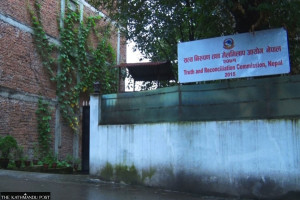National
Coalition’s vote alliance will depend on how the US grant moves ahead
Sources say Deuba has been telling Congress leaders not to discuss poll alliance until MCC issue takes decisive turn.
Anil Giri
It happened pretty fast.
Prime Minister Sher Bahadur Deuba, who appeared to have come under pressure to delay local elections initially and later reached a deal with coalition partners to hold them by mid-June, on Monday told the Election Commission that polls should be held on May 18.
A formal announcement by the government is pending.
But a key question arises here—what is the status of the ruling coalition on an electoral alliance?
Are all five parties in the coalition going to fight the local elections under an alliance? Whether the coalition will continue to stick together for upcoming federal and provincial elections. Whether the partners will part ways.
Deuba is currently leading a five-party coalition government of the Nepali Congress, the Communist Party of Nepal (Maoist Centre), the CPN (Unified Socialist), the Janata Samajbadi Party and the Rastriya Janamorcha.
Multiple leaders from the ruling alliance the Post spoke to said local elections are but one thing, when it comes to the coalition partnership, it largely boils down to the Millennium Challenge Corporation compact, a $500 million American grant which Nepal signed up to in 2017.
And, for Deuba, an alliance through the polls does not seem to be a very convincing idea as he finds himself emboldened after his reelection as party president.
Two senior Nepali Congress leaders told the Post that Prime Minister Deuba is not much interested in over-inflating the issue of pre-election alliance. According to them, their party president is well aware of the fact that he needs to tread carefully.
The understanding, by and large, in Deuba’s orbit is at least until the elections, the current alliance should continue. The current coalition, however, faces the risk of a breakdown over the Millennium Challenge Corporation compact.
Deuba is learnt to have used multiple channels to seek support from the main opposition CPN-UML to get the US grant through Parliament.
At least two of Deuba’s coalition partners—the Maoist Centre and the CPN (Unified Socialist)—are against MCC’s parliamentary ratification.
The two parties have for quite a while been saying that the current alliance will continue during all levels of elections, something many find quite unlikely.
According to a Congress leader, at times Deuba has expressed reservations about statements by some party leaders on an electoral alliance with coalition partners.
Some Congress leaders like Shekhar Koirala and General Secretary Gagan Thapa do not appear to be keen on continuing the alliance for polls.
“I am against any poll alliance with the coalition partners; it is just next to impossible even when it comes to local elections,” said Koirala. “There are so many aspects we need to look at. Some adjustments… a couple of seats here and there could be considered, but fighting local elections under an alliance with current coalition partners is not a good idea.”
More than the Congress, it’s the Maoist Centre and the CPN (Unified Socialist) who want a poll alliance with the Congress.
An answer to why is not rocket science, say leaders.
The Maoist Centre was reborn in March last year after its 2018 merger with the UML was invalidated by the Supreme Court. It lacks the vote base and agenda.
The CPN (Unified Socialist) was formed in August after splintering from the UML. It is yet to set up its organisational structure, with the leadership itself not aware of where the party actually stands.
Deuba’s only concern, however, is, say Congress leaders, that the UML still holds sway at the local level.
If the Maoist Centre and the CPN (Unified Socialist) agree to ratify the MCC compact from Parliament, there could be an electoral alliance with them, according to another Congress leader.
“If the coalition breaks apart over the MCC issue, we cannot think of an electoral alliance,” said the leader who is close to Deuba.
Koirala, the Congress leader who lost the race for party presidency to Deuba in December, said Congress and coalition partners are poles apart on the MCC.
“How can we go together with parties that harbour a completely opposite view to us on some issues including the MCC?” Koirala told the Post. “What will the opposition and general public say? So it is neither logically justified nor morally correct to go for elections jointly with the parties that have opinions contradicting ours.”
Some within the Congress, however, have a soft corner for the coalition partners, especially the Maoist Centre and the CPN (Unified Socialist), for their support in installing Deuba as prime minister.
“The party president is leading a coalition government now,” said Purna Bahadur Khadka, a vice president of Congress.
“This is not the right time to bring up the debate whether there should be an alliance for upcoming polls or whether the coalition will break apart. It will depend on how the alliance moves forward on very many issues.”
According to Khadka, a pre-poll alliance is yet to be discussed inside the party and the party’s Central Working Committee.
“The Central Working Committee will take a final decision,” he said.
Sources said Deuba has been telling some party leaders not to raise the issue of pre-poll alliance before the MCC issue takes a decisive turn.
Some alliance leaders also share views similar to Deuba.
“Whether we can maintain the alliance during elections largely depends on the MCC passage,” said a Janata Samajbadi Party leader. “Some of our friends are obsessed with the MCC and view it through the traditional communist lenses. In practical terms, it is difficult to continue the alliance for elections but it is not that impossible too. Let’s see how the MCC issue evolves,” said Baburam Bhattarai, the federal council chair of the Janata Samajbadi Party.
A CPN (Unified Socialist) leader said that his party fearing elections is nothing but a rumour.
“We are ready to face elections alone if the ruling alliance breaks up,” said Gangalal Tuladhar, a senior CPN (Unified Socalist) leader. “If the alliance decides to go together, we are ready for a pre-poll alliance. If they decide to go separately, we will fight the elections on our own. It is the collective decision of the alliance to go for elections.”




 22.79°C Kathmandu
22.79°C Kathmandu















